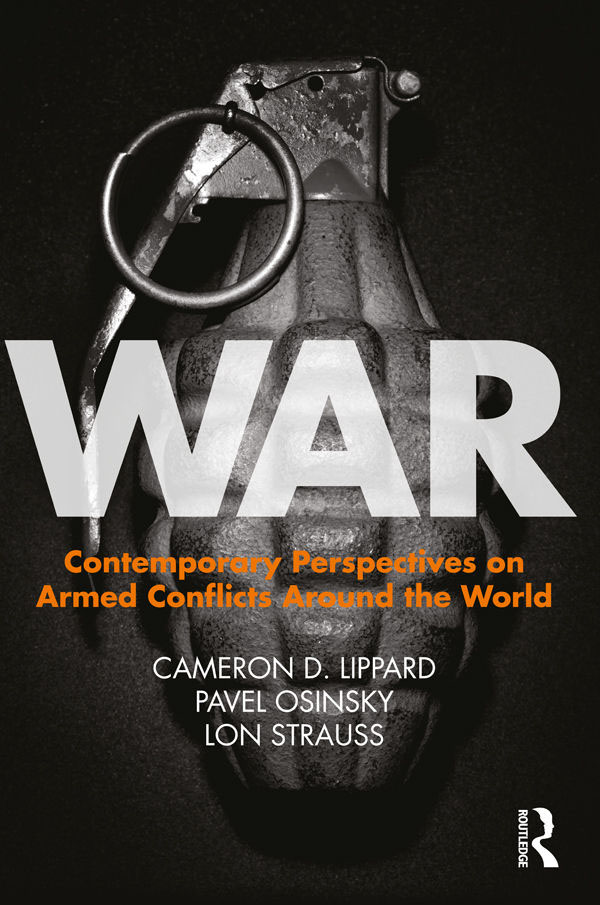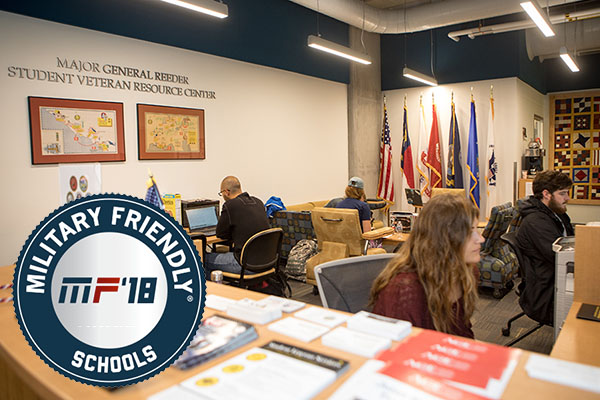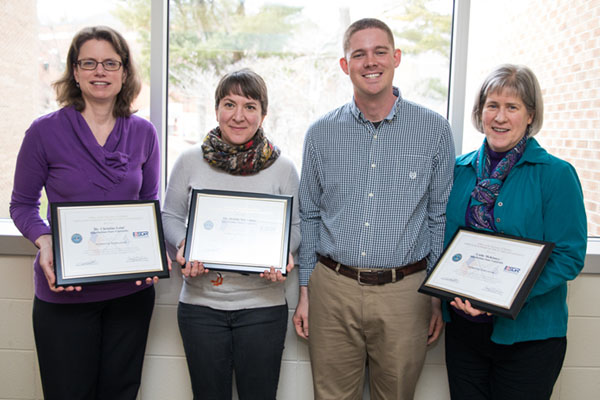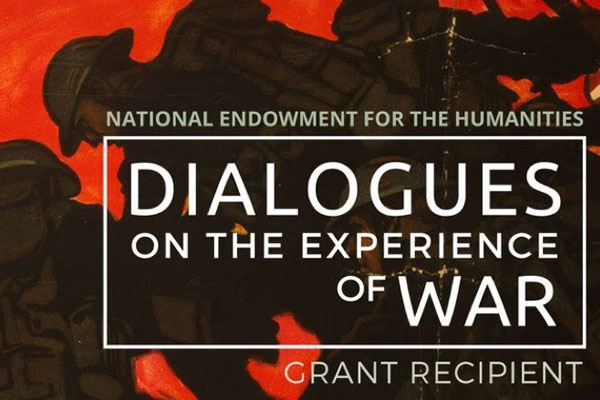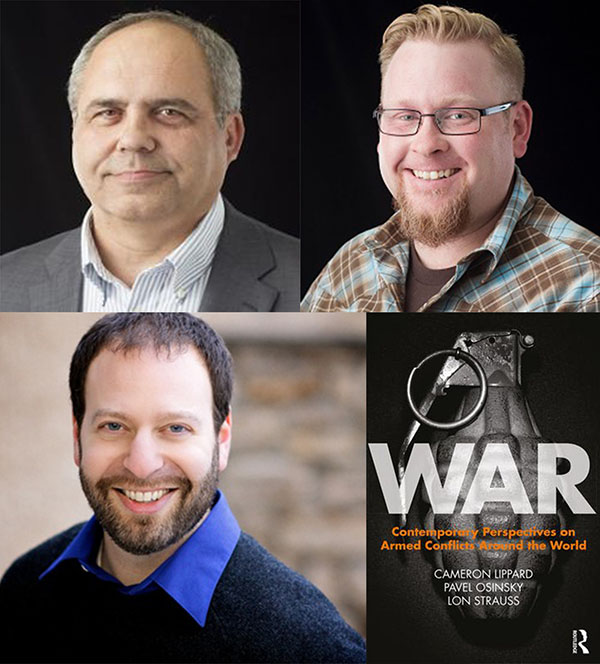
Dr. Pavel Osinsky, top left, and Dr. Cameron Lippard, top right, both of whom are associate professors in Appalachian’s Department of Sociology, along with Dr. Lon Strauss, assistant professor of military history at Marine Corps University, are the authors of “War: Contemporary Perspectives on Armed Conflicts Around the World,” an interdisciplinary textbook about war and its impacts on human society.
BOONE, N.C. — Noting the perpetual nature of war and its impact on Americans and others around the world, Drs. Cameron Lippard ’98 and Pavel Osinsky, both associate professors in Appalachian State University’s Department of Sociology, set out to create a comprehensive, interdisciplinary textbook to explain war today.
The result of their effort is the recently published “War: Contemporary Perspectives on Armed Conflicts around the World,” which Lippard and Osinsky co-authored with Dr. Lon Strauss, assistant professor of military history at Marine Corps University in Quantico, Virginia.
All three professors teach courses related to war, with few resources that provide broad theoretical and empirical evidence that encourages discussion of contemporary war issues among undergraduate students. They realized their students have lived their entire lives with war in the background; many of them are veterans who have been deployed several times to war zones in the Middle East.
“My students look to me for more information about war … particularly how to stop it and what citizens can do to be more supportive of veterans returning who are suffering from various forms of trauma,” Lippard said.
The authors spent three years constructing the textbook, which consists of seven chapters examining various theoretical and empirical arguments about the causes and consequences of war. These chapters include an examination of how culture shapes meanings of war; a discussion on war and its relationship to social stratification; military participation and its consequences; and the world’s attempts at peace and anti-war movements.
“War is ever present on the minds of people around the world. To date, 22 major conflicts rage on across the globe and most will continue into the near future with no real resolve,” Lippard said.
“In the United States, war has been a constant since the terrorist attacks of Sept. 1, 2001. American and allied forces have spent almost 17 years at war in Afghanistan with various terrorist organizations. And, while the war in Iraq was declared a ‘success’ in 2003 by former U.S. President George W. Bush, this war continued on for another eight years until a majority of American forces were withdrawn in 2011. However, the U.S. and other countries around the world still find themselves involved there in some of the most deadly and risky war operations ever seen.”
“War: Contemporary Perspectives on Armed Conflicts around the World,” a Routledge publication, is available for purchase in e-book, paperback and hardback formats from Routledge, and in both e-book and paperback formats through Amazon.
Those interested in learning more about the book and its use in the classroom should contact Lippard at [email protected].
By Cameron Lippard, Pavel Osinsky and Lon Strauss
2018
About the authors
Lippard is a 1998 graduate of Appalachian, having earned his Bachelor of Arts in both psychology and general sociology. His teaching interests include race and ethnic relations, immigration, sociology of war and research methods.
Lippard’s primary research agenda examines the social integration of Latino immigrants into the American South, as well as examining how individuals and people use colorblind language to justify racist actions and policies. He also studies issues of postmodern cultural shifts in the U.S. and abroad concerning the rise of craft beer, “legal moonshine” and fair trade coffee.
Lippard’s articles have appeared in Sociology of Race and Ethnicity, Latino Studies, the Journal of Applied Social Science and Sociology Compass. His most recent book publications include “Building Inequality: Race, Ethnicity, and Latino Immigration in the Atlanta Construction Industry”; “Being Brown in Dixie: Race, Ethnicity, and Latino Immigration in the New South”; and editing of “Race and Racism in the United States,” a four-volume encyclopedia; and “Untapped: The Cultural Dimensions of Craft Beer.”
Osinsky holds a doctorate in philosophy from Moscow State University in Russia and a doctorate in sociology from Northwestern University in Evanston, Illinois.
His primary field of specialization is comparative historical sociology, with a particular interest in examining the impact of the world wars of the 20th century on the revolutionary cataclysms and the communist state-building in Eastern Europe and East Asia.
His articles have been published in the Annual Review of Sociology, Sociological Forum, Sociological Quarterly, Political Power and Social Theory, Work & Occupations, Research in Economic History and other academic journals.
Osinsky teaches classes in sociological theory, political sociology and globalization at Appalachian.
Strauss served as a visiting assistant professor of history at Appalachian from 2014-16 and as a visiting professor at the U.S. Army War College from 2016-17. Currently, he is a section-editor with 1914-1918-online – International Encyclopedia of the First World War, an English-language online reference work on World War I.
His research interests include United States and society in World War I, the Progressive Era, civil-military relations, civil liberties, pacifism and conscientious objection, political psychology, surveillance, national security, military operations and the Red Scare, among others.
Strauss’ article “Fear of Infectious Dissent: First World War Military Intelligence, Labor, and the Conscientious Objection of Erling Lunde” was published in Workers of the World: International Journal on Strikes and Social Conflicts. His other publications include chapters “Breakthrough and Pursuit” and “U.S. Military Planning during the Interwar Period,” which are featured in “A Concise History of the Meuse-Argonne” and “The Routledge Handbook of American Military and Diplomatic History: 1865 to the Present,” respectively.
In 2009, Strauss was a Fellow at the U.S. Military Academy’s Summer Seminar in Military History. Additionally, he was the recipient of a U.S. Army Center of Military History Dissertation Fellowship in 2010-11.
Strauss is currently finishing a manuscript on the U.S. Army’s Military Intelligence Division titled “Uncle Sam is Watching: Surveillance of Civilians in the First World War.”
About the Department of Sociology
The Department of Sociology offers a Bachelor of Arts and seven Bachelor of Science concentrations (applied research methods; criminology; families and intimate relationships; health and aging; power and social change; social inequalities; and individually designed, which requires departmental approval). The department also offers minors in sociology and health and aging, plus two online graduate certificates: aging, health and society, and sociology. Learn more at https://soc.appstate.edu.
About the College of Arts and Sciences
The College of Arts and Sciences (CAS) at Appalachian State University is home to 17 academic departments, two centers and one residential college. These units span the humanities and the social, mathematical and natural sciences. CAS aims to develop a distinctive identity built upon our university's strengths, traditions and locations. The college’s values lie not only in service to the university and local community, but through inspiring, training, educating and sustaining the development of its students as global citizens. More than 6,800 student majors are enrolled in the college. As the college is also largely responsible for implementing App State’s general education curriculum, it is heavily involved in the education of all students at the university, including those pursuing majors in other colleges. Learn more at https://cas.appstate.edu.
About Appalachian State University
As a premier public institution, Appalachian State University prepares students to lead purposeful lives. App State is one of 17 campuses in the University of North Carolina System, with a national reputation for innovative teaching and opening access to a high-quality, cost-effective education. The university enrolls more than 21,000 students, has a low student-to-faculty ratio and offers more than 150 undergraduate and 80 graduate majors at its Boone and Hickory campuses and through App State Online. Learn more at https://www.appstate.edu.
What do you think?
Share your feedback on this story.
